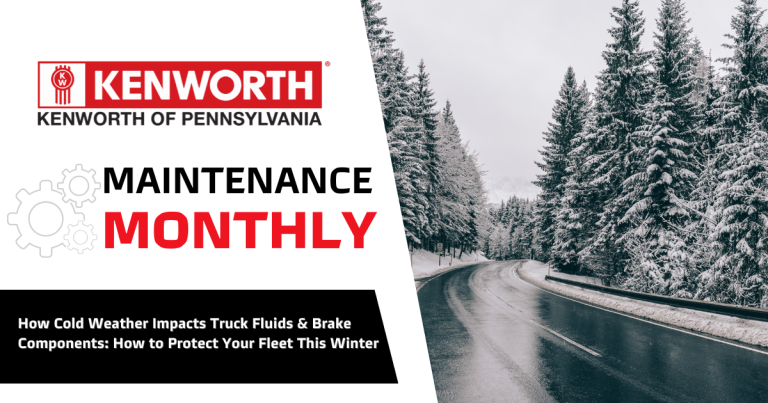
As temperatures drop, commercial trucks and drivers face an entirely new set of maintenance challenges. Two areas that can take the biggest hit when winter arrives are truck fluids and brake components. It is crucial that these components are in good standing for safe and reliable truck operation. Understanding how cold weather affects these systems, and knowing when to act, can prevent breakdowns, reduce repair costs, and overall, keep your fleet running smoothly and safely all season long.
Freezing temperatures can drastically affect the performance and viscosity of the fluids your trucks rely on every day. Check out the list of items you should watch below:
Cold weather tends to thicken oil, making it harder for the engine to crank and lubricate properly.
Diesel can begin to gel as temperatures fall below freezing.
Coolant must maintain the correct freezing point to protect the engine.
DEF begins to crystallize at 12°F.
Cold temperatures increase fluid thickness, slowing system responsiveness.
Winter roads are treated with salt, brine, and chemical deicers that can dramatically increase corrosion, especially on brake systems.
Brake parts like calipers, rotors, pads, air valves, springs, and ABS sensors sit low to the ground, right in the path of:
This combination of factors speeds up corrosion and can weaken brake parts faster than normal winter wear.
Regular washouts help to remove salt and brine before they can cause lasting damage, especially important after winter storms.
Check the status of the following components:
Moisture in air lines expands when frozen, causing blockages and ultimately brake malfunctions. Make sure your truck air dryers are serviced and function properly. Treat system with alcohol if needed.
Spraying protective coatings on brake components and undercarriages can significantly extend part life.
Winter weather only amplifies problems further. Small issues become roadside breakdowns in freezing temperatures. Be sure to identify any potential issues or needed replacements prior to hitting the road this winter season.
Cold weather does not just make driving conditions more dangerous; it places extra stress on the essential systems your trucks rely on day-to-day. By taking steps to protect both your fluids and brake components now, you will reduce downtime, improve safety, and keep your fleet performing optimally all winter long.
Have any questions or need to schedule your preventative maintenance for winter? Trust your local Kenworth of Pennsylvania branch to get the job done. Schedule a service with us today!